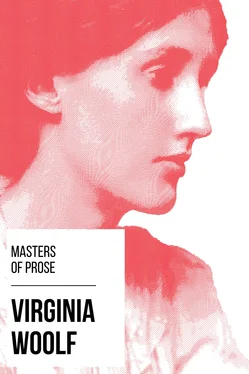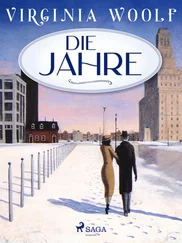To give a truthful account of London society at that or indeed at any other time, is beyond the powers of the biographer or the historian. Only those who have little need of the truth, and no respect for it--the poets and the novelists--can be trusted to do it, for this is one of the cases where the truth does not exist. Nothing exists. The whole thing is a miasma--a mirage. To make our meaning plain--Orlando could come home from one of these routs at three or four in the morning with cheeks like a Christmas tree and eyes like stars. She would untie a lace, pace the room a score of times, untie another lace, stop, and pace the room again. Often the sun would be blazing over Southwark chimneys before she could persuade herself to get into bed, and there she would lie, pitching and tossing, laughing and sighing for an hour or longer before she slept at last. And what was all this stir about? Society. And what had society said or done to throw a reasonable lady into such an excitement? In plain language, nothing. Rack her memory as she would, next day Orlando could never remember a single word to magnify into the name something. Lord O. had been gallant. Lord A. polite. The Marquis of C. charming. Mr M. amusing. But when she tried to recollect in what their gallantry, politeness, charm, or wit had consisted, she was bound to suppose her memory at fault, for she could not name a thing. It was the same always. Nothing remained over the next day, yet the excitement of the moment was intense. Thus we are forced to conclude that society is one of those brews such as skilled housekeepers serve hot about Christmas time, whose flavour depends upon the proper mixing and stirring of a dozen different ingredients. Take one out, and it is in itself insipid. Take away Lord O., Lord A., Lord C., or Mr M. and separately each is nothing. Stir them all together and they combine to give off the most intoxicating of flavours, the most seductive of scents. Yet this intoxication, this seductiveness, entirely evade our analysis. At one and the same time, therefore, society is everything and society is nothing. Society is the most powerful concoction in the world and society has no existence whatsoever. Such monsters the poets and the novelists alone can deal with; with such something-nothings their works are stuffed out to prodigious size; and to them with the best will in the world we are content to leave it.
Following the example of our predecessors, therefore, we will only say that society in the reign of Queen Anne was of unparalleled brilliance. To have the entry there was the aim of every well-bred person. The graces were supreme. Fathers instructed their sons, mothers their daughters. No education was complete for either sex which did not include the science of deportment, the art of bowing and curtseying, the management of the sword and the fan, the care of the teeth, the conduct of the leg, the flexibility of the knee, the proper methods of entering and leaving the room, with a thousand etceteras, such as will immediately suggest themselves to anybody who has himself been in society. Since Orlando had won the praise of Queen Elizabeth for the way she handed a bowl of rose water as a boy, it must be supposed that she was sufficiently expert to pass muster. Yet it is true that there was an absentmindedness about her which sometimes made her clumsy; she was apt to think of poetry when she should have been thinking of taffeta; her walk was a little too much of a stride for a woman, perhaps, and her gestures, being abrupt, might endanger a cup of tea on occasion.
Whether this slight disability was enough to counterbalance the splendour of her bearing, or whether she inherited a drop too much of that black humour which ran in the veins of all her race, certain it is that she had not been in the world more than a score of times before she might have been heard to ask herself, had there been anybody but her spaniel Pippin to hear her, 'What the devil is the matter with me?' The occasion was Tuesday, the 16th of June 1712; she had just returned from a great ball at Arlington House; the dawn was in the sky, and she was pulling off her stockings. 'I don't care if I never meet another soul as long as I live,' cried Orlando, bursting into tears. Lovers she had in plenty, but life, which is, after all, of some importance in its way, escaped her. 'Is this', she asked--but there was none to answer, 'is this', she finished her sentence all the same, 'what people call life?' The spaniel raised her forepaw in token of sympathy. The spaniel licked Orlando with her tongue. Orlando stroked the spaniel with her hand. Orlando kissed the spaniel with her lips. In short, there was the truest sympathy between them that can be between a dog and its mistress, and yet it cannot be denied that the dumbness of animals is a great impediment to the refinements of intercourse. They wag their tails; they bow the front part of the body and elevate the hind; they roll, they jump, they paw, they whine, they bark, they slobber, they have all sorts of ceremonies and artifices of their own, but the whole thing is of no avail, since speak they cannot. Such was her quarrel, she thought, setting the dog gently on to the floor, with the great people at Arlington House. They, too, wag their tails, bow, roll, jump, paw, and slobber, but talk they cannot. 'All these months that I've been out in the world', said Orlando, pitching one stocking across the room, 'I've heard nothing but what Pippin might have said. I'm cold. I'm happy. I'm hungry. I've caught a mouse. I've buried a bone. Please kiss my nose.' And it was not enough.
How, in so short a time, she had passed from intoxication to disgust we will only seek to explain by supposing that this mysterious composition which we call society, is nothing absolutely good or bad in itself, but has a spirit in it, volatile but potent, which either makes you drunk when you think it, as Orlando thought it, delightful, or gives you a headache when you think it, as Orlando thought it, repulsive. That the faculty of speech has much to do with it either way, we take leave to doubt. Often a dumb hour is the most ravishing of all; brilliant wit can be tedious beyond description. But to the poets we leave it, and so on with our story.
Orlando threw the second stocking after the first and went to bed dismally enough, determined that she would forswear society for ever. But again as it turned out, she was too hasty in coming to her conclusions. For the very next morning she woke to find, among the usual cards of invitation upon her table, one from a certain great Lady, the Countess of R. Having determined overnight that she would never go into society again, we can only explain Orlando's behaviour--she sent a messenger hot-foot to R-- House to say that she would attend her Ladyship with all the pleasure in the world--by the fact that she was still suffering from the effect of three honeyed words dropped into her ear on the deck of the "Enamoured Lady" by Captain Nicholas Benedict Bartolus as they sailed down the Thames. Addison, Dryden, Pope, he had said, pointing to the Cocoa Tree, and Addison, Dryden, Pope had chimed in her head like an incantation ever since. Who can credit such folly? but so it was. All her experience with Nick Greene had taught her nothing. Such names still exercised over her the most powerful fascination. Something, perhaps, we must believe in, and as Orlando, we have said, had no belief in the usual divinities she bestowed her credulity upon great men--yet with a distinction. Admirals, soldiers, statesmen, moved her not at all. But the very thought of a great writer stirred her to such a pitch of belief that she almost believed him to be invisible. Her instinct was a sound one. One can only believe entirely, perhaps, in what one cannot see. The little glimpse she had of these great men from the deck of the ship was of the nature of a vision. That the cup was china, or the gazette paper, she doubted. When Lord O. said one day that he had dined with Dryden the night before, she flatly disbelieved him. Now, the Lady R.'s reception room had the reputation of being the antechamber to the presence room of genius; it was the place where men and women met to swing censers and chant hymns to the bust of genius in a niche in the wall. Sometimes the God himself vouchsafed his presence for a moment. Intellect alone admitted the suppliant, and nothing (so the report ran) was said inside that was not witty.
Читать дальше











